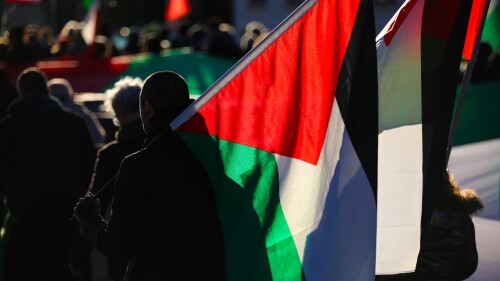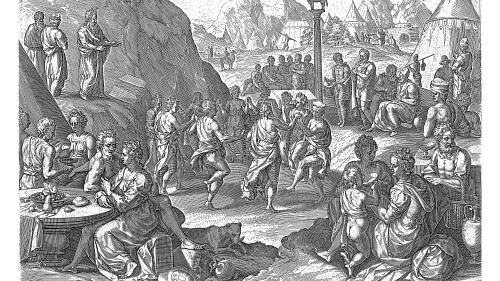In a March 14 sermon, Lebanon’s Maronite Christian Patriarch, Bechara Boutros Al-Rai, called on the Lebanese people to “liberate the state from all that hinders its authority” and decried “illegitimate and non-Lebanese arms” in the country. |
Lebanon is in the midst of economic and political gridlock as its politicians fail to form a government, causing widespread national, regional and international frustration. The situation is a direct result of the alignment between two political wills. Internally, the faction headed by Lebanese President Michel Aoun and politician Gebran Bassil (Aoun’s son-in-law) will not let a government be formed of which they don’t have complete control. Regionally, Iran wishes to keep Lebanon hostage in order to use it for added leverage in its negotiations with the West.
The continuing deterioration of conditions in the country—internal unrest and protests along with the closure of stores and businesses with a devalued lira—does not seem to have an end in sight despite growing popular frustration. Last Sunday, the Maronite Patriarch, Bechara Boutros Al-Rai, provided a politically charged sermon in which he called on the Lebanese people “to retrieve the identity of Lebanon.” In his sermon, the patriarch said: “The people are a hostage to those who are fighting for power despite all of the national and international pleas ... the [Lebanese] Army is the legitimate force responsible for the defense of Lebanon and it is not permissible to legitimate the existence of any other arms besides the Army’s.”
Already in a previous speech, the Maronite Patriarch had made a public call that was described by Sa’ad Elias in the pan-Arab daily, Al-Quds Al-Arabi, as “exceptional and historic,” akin to when the patriarchy called on Syria to withdraw from Lebanon in 2000, to drive the “second state” out of Lebanon. He was clearly speaking of Hezbollah and Iran.
In the former speech, attended by thousands outside of his residence despite the COVID risks, the patriarch said,
Today we are facing a coup [against the Lebanese state] ... We liberated the land, let’s now liberate the state from all that hinders its authority and performance ... Every time some people stood with a regional or international axis, people were divided, the state was broken, and wars broke out ... Do not be silent! Do not be silent about the corruption, about the chaos in the investigation of the Beirut Port [explosion], and about the illegitimate and non-Lebanese arms.”
Dissatisfaction with Hezbollah and Iranian influence in Lebanon is simmering. |
Meanwhile, Israel continues to build up its defenses on its northern borders and warn Hezbollah of the consequence of attacking Israel. This week, during a visit by a Hezbollah delegation to Russia, the Russian authorities were reported to have passed a message from Jerusalem to their Hezbollah guests warning them of any military escalations. These reports echo recent statements by Israel’s Defense Minister Benny Gantz warning the Iranian-sponsored terrorist organization that the Israel Defense Forces is ready for any scenario.
The strategic importance of Lebanon to Iran is likely only to increase. |
With each passing day, the situation seems to become more apparent: Lebanon is completely at the mercy of Iran. The deficiencies of Lebanese politicians certainly do not help. Still, Iran seeks to maintain Lebanon as a strategic Shia foothold, a bargaining chip to enhance its position in any future negotiations and a thorn in the northern side of Israel. Given the rising escalation in the regional power struggle in the covert Israeli-Iranian naval war, as well as the increasing frequency of Houthi attacks on Riyadh, the strategic importance of Lebanon to Iran is likely only to increase, which in turn will cast great shadows on the survival of the Lebanese state. Gantz’s remarks exposed an Israeli concern of a possible Houthi-like scenario in southern Lebanon. If such a scenario materializes, the ensuing conflict will have unforeseeable consequences. This means that the Lebanese Shia community is currently fighting for not just primacy but political survival.
For Russia, the situation in Lebanon provides an opportunity to draw that country into its sphere of influence, thus serving Vladimir Putin’s ultimate goal of diminishing America’s presence from the region. The opportunity, however, is not straightforward, as it will require Moscow to outmaneuver Tehran in Lebanon. Suppose Hezbollah concedes to the Russian demand to withdraw from Syria; in that case, Russia could become the sole mediator in Lebanese internal affairs. There is no doubt that Israel prefers a Russian-dominaated Lebanon over an Iranian-dominated one; however, Iran is not easy to push around, and Russia is less concerned with regional interests than with a policy of reducing U.S. influence in the region. Lebanon is quickly becoming a crucial battleground of various interests and agendas, and the United States cannot help the Lebanese people unless it is willing to take a more aggressive posture against Iran and its proxies.
Hussein Aboubakr Mansour is a fellow at the Middle East Forum and director of the Program for Emerging Democratic Voices from the Middle East at the Endowment for Middle East Truth (EMET).








